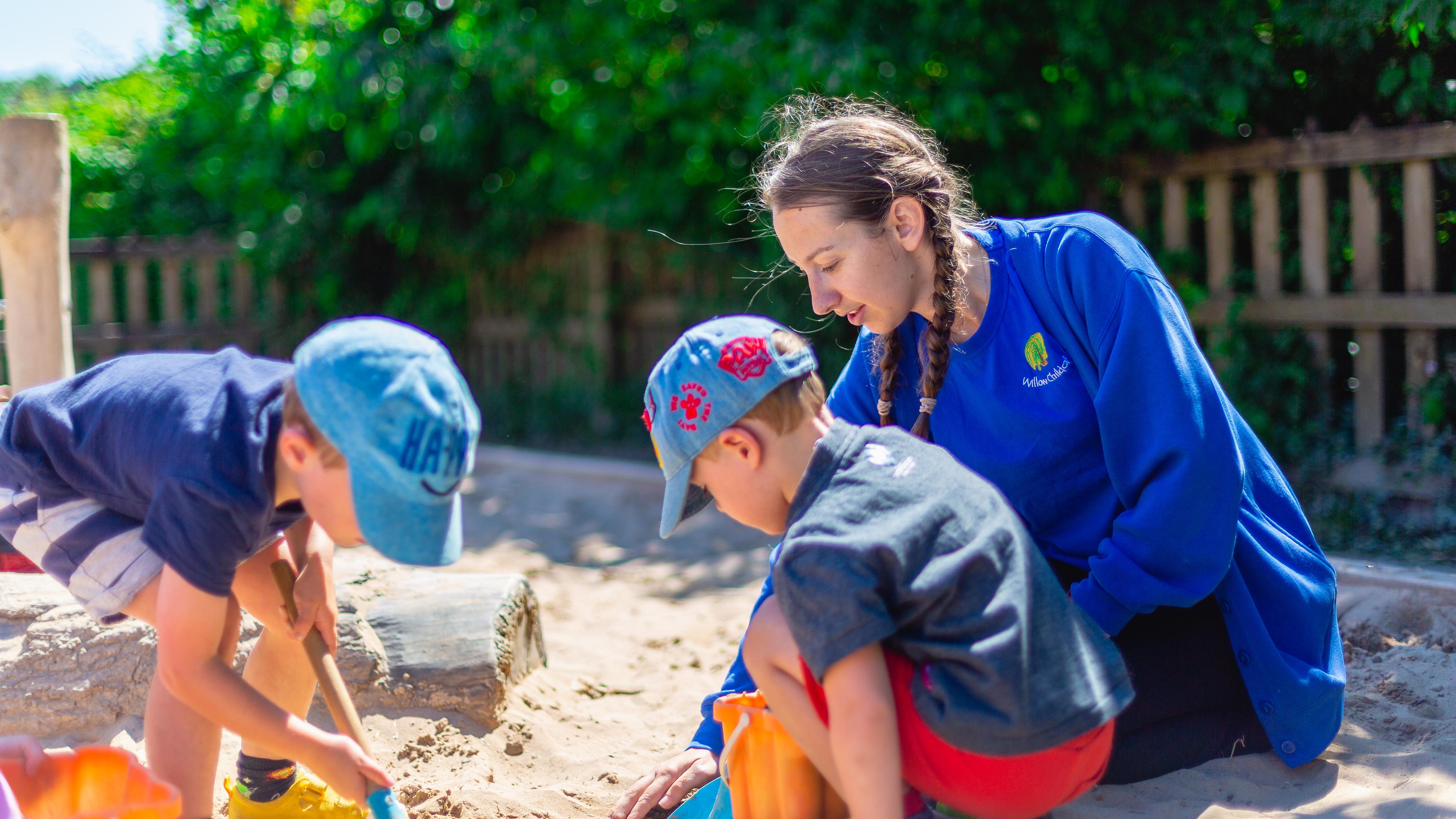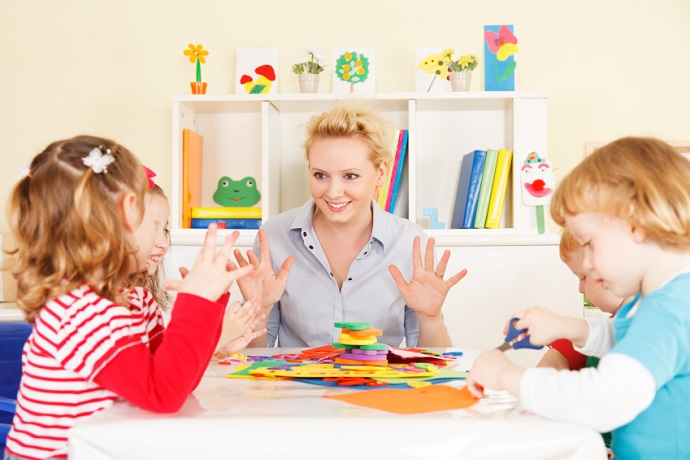
How to Become a Early Years Educator: Step-by-Step Guide
Becoming an early years educator requires passion and dedication. It’s about nurturing young minds with care and creativity.
Early years education shapes the foundational years of a child’s life. It is where children first learn to interact with others, explore their surroundings, and develop basic skills. Being an early years educator is more than just teaching; it’s about guiding and inspiring young children.
This role demands patience, empathy, and innovative thinking. In this blog, we’ll explore the steps to becoming an early years educator. We’ll discuss essential qualifications, skills, and the rewarding aspects of this profession. Whether you’re considering this career or seeking insights, you’ll find valuable information here. Let’s dive into the journey of becoming an early years educator.
Pathway To Early Years Career
Embarking on a career as an Early Years Educator is an enriching journey. You shape young minds and lay the foundation for lifelong learning. Understanding the pathway to this career is crucial. It involves acquiring the right qualifications and certifications. These credentials ensure you provide quality education and care. This pathway is a blend of passion, learning, and dedication. Dive deep into the essentials of becoming an Early Years Educator. This guide highlights the necessary steps and requirements.
Choosing The Right Qualifications
Selecting the appropriate qualifications is vital. It sets the stage for your career as an Early Years Educator. Start with Child Development Courses. They offer insights into how children grow and learn. These courses cover Developmental Milestones. You learn how to support children at each stage of their development. Consider enrolling in programs focused on Early Childhood Education. They provide a comprehensive understanding of young children’s needs.
- Early Years Curriculum: Understand the fundamentals of curriculum design for young children.
- Play-Based Learning: Learn techniques to integrate play into learning effectively.
- Teaching Strategies For Young Children: Discover methods that enhance children’s learning experiences.
| Qualification | Description |
|---|---|
| Childcare Qualifications | Basic courses covering childcare essentials and safety. |
| Preschool Teaching Certifications | Advanced credentials focusing on teaching and classroom management. |
Choosing the right qualifications ensures you’re well-prepared. They equip you with knowledge to foster children’s growth effectively.
Importance Of Certifications
Certifications play a crucial role in your Early Years career. They validate your skills and knowledge. Employers often seek certified professionals. Preschool Teaching Certifications are essential. They highlight your expertise in teaching young children. These certifications often include Classroom Management Techniques. You learn to create a conducive learning environment. Certifications enhance your understanding of Teaching Strategies For Young Children. They provide tools to tailor learning experiences for different needs. Consider certifications that focus on Early Years Curriculum. They ensure you’re adept at designing and implementing effective curricula. Such certifications often cover Play-Based Learning. You learn to use play as a tool for development. Certifications also emphasize understanding Developmental Milestones. They equip you with knowledge to track and support children’s growth.
- Boosts credibility and employability.
- Enhances skills in specialized areas.
- Provides opportunities for professional growth.
Certifications are more than just credentials. They are pathways to becoming a competent and successful Early Years Educator.
Essential Skills For Educators
Becoming an Early Years Educator is a rewarding journey that requires a specific set of skills. These skills are essential in nurturing young minds and creating a supportive learning environment. Educators need to be adept at various techniques to foster growth and development in children. This section explores the vital skills required for educators, focusing on communication and creativity.
Communication Skills
Effective communication is crucial in Early Childhood Education. Educators must master various communication techniques to interact with children, parents, and colleagues. Clear communication helps in understanding children’s needs and developmental milestones. Here are some key components of communication skills for educators:
- Listening: Active listening allows educators to understand and respond to children’s thoughts.
- Verbal Communication: Simple and clear language is essential for engaging young learners.
- Non-verbal Communication: Facial expressions and gestures can convey warmth and understanding.
Developing emotional intelligence is also a part of effective communication. Educators should recognize and respond to children’s emotions, creating a nurturing environment. This enhances classroom management and builds trust with children.
| Technique | Benefits |
|---|---|
| Active Listening | Improves understanding of children’s needs |
| Clear Instructions | Enhances learning through clarity |
| Empathy | Builds trust and emotional connection |
Creativity And Playfulness
Creativity and playfulness are at the heart of play-based learning. Educators should employ pedagogical approaches that encourage exploration and creativity. This is vital for child development, helping them learn through play. Here are some ways educators can foster creativity:
- Interactive Activities: Designing games and activities that stimulate imagination.
- Art and Crafts: Incorporating arts to develop fine motor skills and self-expression.
- Storytelling: Using stories to promote language skills and creativity.
Creativity also involves adapting teaching strategies to suit individual children. Understanding developmental milestones helps in creating personalized learning experiences. A nurturing environment encourages children to explore and learn at their own pace. These skills are critical for educators to create a positive and effective learning atmosphere. Balancing creativity with structured learning ensures holistic development in early childhood.
Gaining Practical Experience
Becoming an early years educator involves more than just acquiring theoretical knowledge. Gaining practical experience is essential to truly understanding the needs of young children. Immersing yourself in real-world settings helps bridge the gap between theory and practice. By engaging with children and educators, you develop skills that are crucial in Early Childhood Education. Here’s how you can gain valuable hands-on experience.
Volunteering Opportunities
Volunteering is an excellent way to gain experience without the pressure of a formal job setting. Many organizations welcome volunteers who are eager to learn about the Early Years Curriculum. As a volunteer, you can engage in Play-Based Learning activities that foster creativity and problem-solving in children. Consider these options for volunteering:
- Local Preschools and Nurseries: Offer your time to assist with daily activities or special events.
- Educational Workshops: Participate in workshops that focus on Child Development Courses and Child Psychology.
- Community Centers: Help with programs designed for young children and their parents.
Volunteering not only helps you gain experience but also allows you to network with professionals. This can be invaluable for future opportunities in Preschool Teacher Training and teaching certifications. Below is a simple table showing potential volunteer roles and their benefits:
| Volunteer Role | Benefits |
|---|---|
| Nursery Assistant Roles | Hands-on experience with young children |
| Workshop Assistant | Learn from educational experts |
| Event Coordinator | Develop organizational skills |
Internships And Apprenticeships
Internships and apprenticeships provide structured learning experiences in a professional setting. These opportunities are ideal for those pursuing Childcare Qualifications and Preschool Teacher Training. Working under experienced professionals allows you to apply what you’ve learned in Child Development Courses to real situations. Consider pursuing internships or apprenticeships in the following areas:
- Early Childhood Education Centers: Gain insights into the daily operations and curriculum design.
- Teaching Certifications Programs: Work alongside certified teachers to learn effective teaching strategies.
- Child Psychology Clinics: Understand the behavioral aspects of young children.
These experiences not only enhance your resume but also build your confidence as an aspiring educator. You’ll have the chance to observe and participate in the application of Play-Based Learning, which is a cornerstone of the Early Years Curriculum. Internships and apprenticeships offer a pathway to becoming a skilled and knowledgeable early years educator.

Building A Professional Network
Building a professional network is crucial for anyone aspiring to become an Early Years Educator. Connections with other professionals in the field can provide insights, support, and growth opportunities. As an Early Years Practitioner, establishing a solid network helps you stay informed about the latest Early Learning Standards and Teaching Strategies. This collaborative approach fosters a better understanding of Developmental Milestones and enhances your capability to deliver quality education.
Joining Professional Associations
Becoming a member of professional associations is a valuable step in your journey as an Early Years Practitioner. These organizations offer numerous benefits:
- Access to Resources: Members often receive exclusive content, including research papers and educational materials related to Early Childhood Education.
- Networking Opportunities: Engage with other educators and professionals, facilitating discussion and exchange of ideas.
- Professional Development: Associations frequently offer training sessions and webinars that keep you updated with current Child Development practices.
Joining associations such as Child Care Associations can be beneficial. Consider the following:
| Association Name | Benefits |
|---|---|
| National Association for the Education of Young Children (NAEYC) | Offers professional development, resources, and networking opportunities. |
| Early Childhood Education Association | Provides educational workshops and conferences for skill enhancement. |
Attending Workshops And Conferences
Workshops and conferences are excellent venues for expanding your knowledge and skills as an Early Years Educator. They offer:
- Hands-on Learning: Participate in interactive sessions that cover Teaching Strategies and Developmental Milestones.
- Expert Insights: Listen to talks from leading professionals in the field of Child Development.
- Networking Possibilities: Meet peers and experts, fostering relationships that can support your career growth.
Consider attending events focused on Early Childhood Education. Here’s why:
| Event Type | Benefits |
|---|---|
| Educational Workshops | Provide practical training and enhance your teaching methods. |
| Conferences | Offer platforms to learn about new Early Learning Standards and industry trends. |
These events not only improve your skills but also broaden your perspective in the field, helping you to become a more effective Early Years Practitioner.
Understanding Child Development
Becoming an Early Years Educator involves more than just teaching. It requires a deep understanding of child development. This knowledge is crucial for creating an effective Early Years Curriculum. It helps you support each child’s unique growth journey. Understanding child development allows educators to tailor Age-Appropriate Learning experiences. These experiences foster Cognitive Development, Social-Emotional Skills, and overall well-being. Let’s explore the key Developmental Stages and Child Development Milestones that are essential for every Early Childhood Education professional.
Stages Of Development
Child development unfolds in specific stages. Each stage is characterized by unique changes and abilities. Recognizing these stages helps Preschool Teachers and Early Years Educators provide appropriate support.
- Infancy (0-2 years): Rapid physical growth and sensory exploration. Babies learn to crawl, walk, and speak simple words.
- Toddlerhood (2-3 years): Increased mobility and curiosity. Toddlers engage in more complex play and start forming sentences.
- Preschool Age (3-5 years): Development of social skills and independence. Children learn to interact with peers and follow simple instructions.
Each stage presents unique opportunities for Play-Based Learning. This method supports Cognitive Development and encourages creativity. The table below outlines key activities for each stage:
| Stage | Key Activities |
|---|---|
| Infancy | Sensory play, simple songs |
| Toddlerhood | Building blocks, outdoor play |
| Preschool Age | Role play, storytelling |
Milestones To Monitor
Monitoring Child Development Milestones is vital in Early Childhood Education. These milestones help educators assess a child’s progress and identify areas needing support. Key milestones include:
- Physical Development: Watch for skills like crawling, walking, and hand-eye coordination.
- Cognitive Development: Observe problem-solving abilities and curiosity about the world.
- Language Skills: Listen for new vocabulary and sentence formation.
- Social-Emotional Skills: Note interactions with peers and ability to express emotions.
Recognizing these milestones ensures that learning is tailored to each child’s needs. An Early Years Educator can adjust activities to promote growth in all areas. This approach not only supports individual development but also prepares children for future learning. Understanding these milestones is a core part of Preschool Teacher Qualifications. It helps educators create a nurturing environment that fosters comprehensive growth.

Creating Engaging Learning Environments
Creating engaging learning environments is vital in Early Years education. These spaces are where young minds begin to explore the world. They foster growth through play, social-emotional learning, and structured activities. Designing these environments requires creativity, thoughtfulness, and an understanding of child development strategies. The goal is to create a nurturing space that supports curriculum development for young learners and encourages exploration and curiosity.
Classroom Setup
The physical setup of a classroom plays a crucial role in enhancing learning experiences for young children. A well-organized classroom provides a safe space for exploration and learning. Consider these elements when setting up your classroom:
- Zones for Play-Based Learning: Create dedicated areas for different types of play. Include zones for art, reading, sensory activities, and construction. Each zone should encourage creativity and focus.
- Flexible Seating Arrangements: Use furniture that can be rearranged easily. This allows children to move freely and fosters social-emotional learning. Bean bags, cushions, and child-sized tables are excellent choices.
- Visual Stimuli: Decorate walls with colorful images and educational posters. These can include numbers, alphabets, and nature scenes. Visuals support learning and keep the environment lively.
Classroom management techniques are essential for maintaining a productive space. Organize materials and resources in accessible locations. Use labels and pictures to help children identify and return items. This encourages independence and responsibility.
| Element | Purpose |
|---|---|
| Zones | Promote diverse play types |
| Flexible Seating | Encourage movement and interaction |
| Visual Stimuli | Enhance learning and engagement |
Incorporating Outdoor Learning
Outdoor learning is a vital component of early childhood education. The natural world offers unique opportunities for child development strategies and exploration. Incorporating outdoor educational activities can enhance learning experiences significantly. Consider the following ideas for outdoor learning:
- Nature Walks: Organize regular walks in nearby parks. Observe plants, insects, and birds. Encourage children to ask questions and share observations.
- Outdoor Play Stations: Set up stations with sandbox, water play, and garden beds. These stations promote sensory play and physical development.
- Seasonal Activities: Plan activities that reflect the seasons. Leaf collecting in fall, snow sculpture in winter, and planting seeds in spring. These activities enrich curriculum development for young learners.
Outdoor learning fosters creativity and curiosity. It complements indoor classroom activities and broadens children’s perspectives. Ensure safety by supervising activities closely and using appropriate equipment. Preschool teacher training often includes strategies for outdoor learning, highlighting its importance. The integration of outdoor spaces with indoor learning environments supports holistic development. These experiences lay a foundation for lifelong learning and appreciation for the natural world.
Navigating Employment Opportunities
Embarking on a journey to become an Early Years Practitioner opens doors to fulfilling careers in shaping young minds. Navigating employment opportunities in this field involves understanding various roles and strategizing effectively for job searches. Whether aiming to be a Preschool Teacher or a Childcare Worker, knowing the types of roles available and the best strategies to secure a position is crucial. This guide will provide insights into the diverse roles in early childhood education and effective job search strategies to kickstart your career.
Types Of Early Years Roles
Early childhood education offers numerous roles catering to different interests and skills. Each role plays a vital part in child development and education.
- Early Years Practitioner: Focuses on implementing child development theories and practices to nurture young children.
- Preschool Teacher: Responsible for preparing lesson plans, managing classroom activities, and fostering a learning environment.
- Childcare Worker: Provides care and supervision while supporting children’s emotional and physical needs.
Here’s a simple table outlining the roles and their key responsibilities:
| Role | Key Responsibilities |
|---|---|
| Early Years Practitioner | Applying child development theories, assessing growth |
| Preschool Teacher | Creating lesson plans, classroom management |
| Childcare Worker | Supervising and caring for children |
Job Search Strategies
Finding a job in early childhood education requires effective strategies. Here are some tips to help you secure a role that matches your skills:
- Resume Writing For Educators: Tailor your resume to highlight educational qualifications and relevant experience.
- Networking: Connect with professionals in the field through seminars or online forums to learn about job opportunities.
- Professional Development: Continuously upgrade your skills through workshops and courses.
- Job Interview Tips: Prepare for interviews by researching common questions and practicing your responses.
Utilizing these strategies can enhance your chances of finding a suitable position. Networking and professional development are particularly beneficial in keeping up with industry trends.

Continuing Professional Development
Becoming an Early Years professional requires dedication and passion for nurturing young minds. One crucial element of this journey is Continuing Professional Development (CPD). This ongoing process ensures that educators remain proficient in their field. CPD helps Early Years professionals improve their skills and knowledge, ensuring they provide the best learning experiences for children. It covers various aspects such as new teaching methods, child psychology, and classroom management. Through CPD, educators stay informed about the latest trends and research in early childhood education.
Ongoing Education
Ongoing education plays a vital role in the journey of a Preschool Teacher. It involves actively seeking new knowledge and refining skills related to the Early Years Curriculum. Regular participation in workshops, seminars, and courses can enhance a teacher’s understanding of child development and classroom management.
- Workshops: Interactive sessions that focus on practical teaching methods and parenting skills.
- Seminars: Lectures and discussions led by experts in child psychology and early childhood education.
- Online Courses: Flexible learning options that cover various educational qualifications and professional development topics.
Ongoing education also includes self-reflection and feedback from peers. Educators are encouraged to review their teaching practices and adapt them to meet the diverse needs of their students. This proactive approach ensures that they remain effective educators who can foster a positive learning environment for young children.
Staying Updated With Trends
Staying updated with trends is essential for Early Years professionals to maintain relevance in their field. The landscape of early childhood education is ever-changing, with new research and insights emerging regularly. A table of current trends in Early Childhood Education:
| Trend | Description |
|---|---|
| Play-Based Learning | Focus on learning through play to support child development. |
| Inclusive Education | Strategies to accommodate diverse learning needs in the classroom. |
| Technology Integration | Using digital tools to enhance the Early Years Curriculum. |
By following these trends, educators can incorporate innovative teaching methods into their daily practice. Engaging with professional networks and attending conferences can also provide insights into new strategies and tools. Keeping abreast of these trends ensures that educators are well-equipped to meet the challenges of modern early childhood education.
Frequently Asked Questions
How Fast Can You Become A Preschool Teacher?
You can become a preschool teacher in 1-4 years. It depends on your educational path and state requirements. Some states require an associate degree, while others need a bachelor’s. Completing a certification program can also qualify you. Check local regulations for exact timelines.
How Do I Start A Career In Early Childhood?
Begin by earning a degree in early childhood education. Gain experience through internships or volunteering in childcare settings. Obtain necessary certifications or licenses. Network with professionals in the field. Stay updated with the latest teaching methods and child development research.
Is Prek Required In Texas?
Pre-kindergarten is not mandatory in Texas. Families can choose whether to enroll their children in pre-k programs. Public pre-k is available for eligible children, focusing on early childhood education and development. Parents should check specific eligibility criteria for free public pre-k options in their local school districts.
What Is The Minimum Qualification To Work In Childcare?
The minimum qualification to work in childcare is typically a high school diploma or GED. Some positions may require additional certifications like CPR and first aid. Experience working with children or relevant coursework can enhance job prospects in this field.
Always check specific requirements in your region.
Conclusion
Becoming an early years educator is a rewarding journey. You nurture young minds and inspire lifelong learning. Start with the right education and training. Seek hands-on experience and learn from seasoned teachers. Build strong communication skills to engage with children and parents.
Stay patient and adaptable. Every child is unique. Embrace diversity in learning styles. Keep updating your knowledge with new teaching techniques. Make learning fun and safe for kids. Your dedication makes a lasting impact. Ready to shape the future? Begin today.




